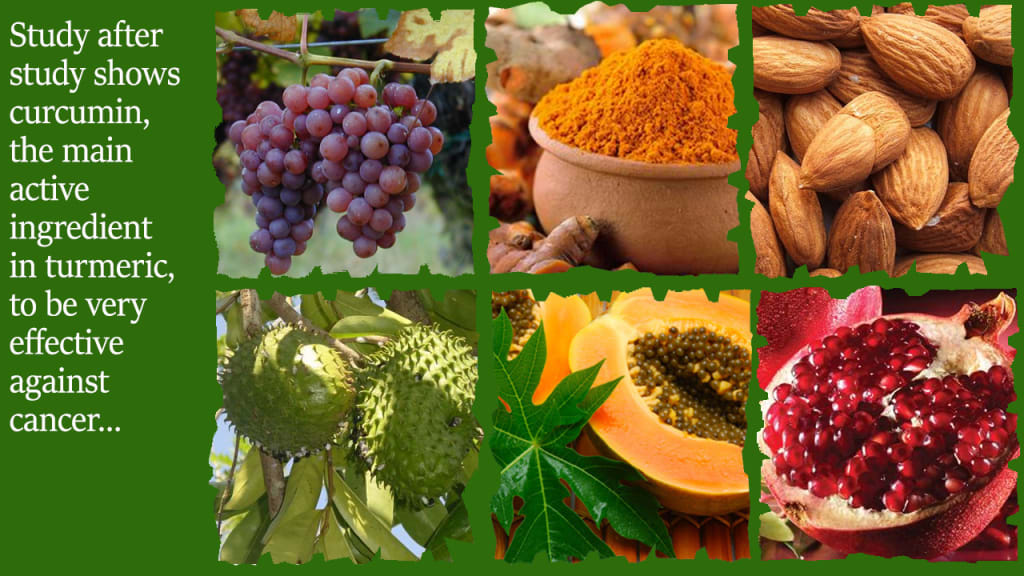Nature's way in the battle against cancer
Almonds and turmeric just some of the potent weapons against the disease

No cancer treatment, conventional or otherwise, comes with an iron-clad guarantee but it is safe to say that many orthodox treatments ravage the body and ignore the underlying causes of the illness, while a range of alternative treatments exist that can strengthen the body and address its healing requirements.
Whilst it would be foolish to completely ignore the benefits of orthodox treatments such as radiotherapy and chemotherapy, a comprehensive approach to healing cancer has to include other factors such as natural remedies; proper nutrition and clean water; detoxification; building the immune system; oxygen therapy; lifestyle changes such as adequate sleep, sunlight and exercise; a positive attitude; and spiritual health.
Regardless of cancer's aggressiveness the body will respond to this holistic approach although the speed and degree to which it does depends on the diligence and extent to which these factors are applied.
There are many natural remedies touted as powerful tools in the battle against cancer which can be exploited for profit, but there is also no question many are backed up by science and offer hope to those suffering from the illness without disrupting conventional treatments.
For decades scientists have associated cannabinoids found in cannabis with powerful healing properties, but it is only now that countries are beginning to see the light and legalise its use for medicinal purposes.
In addition to the cannabis plant, there are many other natural remedies believed to have fantastic healing powers against cancer, including graviola, turmeric, dandelion root, bitter almonds, apricot pits, ginger, mangosteen, papaya leaves and moringa... and these are just a few of the natural remedies that can work independently or alongside conventional treatment.
Laetrile therapy has been shown to be one of the most effective (and controversial) natural cancer treatments, combining amygdalin with other factors to create a potent treatment that fights cancer cells while helping to strengthen the body’s immune system.
Amygdalin is a natural substance found in raw nuts such as almonds and the seeds and kernels of many fruits, particularly apricots. It’s also present in lima beans, clover, sorghum, and other natural foods. The concentrated, purified form developed for use in the laboratory and in treatments is called laetrile.
Although it is not technically a vitamin, food components that are natural, non-toxic, water-soluble and compatible with human metabolisms, such as amygdalin, are called vitamins. That’s why it is known as vitamin B17.
What makes vitamin B17 so powerful is the fact it is comprised of glucose and hydrogen cyanide. The way it actively destroys cancer cells is by the glucose ‘injecting’ itself into the cancer cell. Then the cyanide and benzaldahyde from the glucose create a targeted poison that kills the cancer cell.
This natural form of chemotherapy was, and still is, considered controversial because many medical professionals consider it to be toxic because it contains small amounts of hydrogen cyanide, but it would take a ridiculous amount of apricot seeds to produce sufficient cyanide in the body to be of any harm.
Study after study also shows curcumin, the main active ingredient in turmeric, to be very effective against cancer, affecting not just a single target but dozens of targets and pathways involved in cancer.
Curcumin has a long history in Chinese and Indian medicine for its ability to fight many chronic disorders due to its antioxidant, anti-inflammatory and lipid-lowering properties. Moreover, curcumin has been found to be one of the most powerful natural compounds able to drastically impact cancer progression.
Curcumin is widely believed to help protect against cancer initiation, slow its growth when it occurs, and even sensitise cancer cells to treatment.
Both laboratory and live animal studies demonstrate that the compound can dramatically reduce the occurrence and severity of malignant tumours. Curcumin can fight cancer through at least eight different mechanisms, from its earliest stage of development through all stages of progression.
Graviola or soursop, a flowering evergreen tree native to tropical regions, is also said to kill cancer more effectively than chemotherapy drugs.
While all parts of the tree can be used medicinally including the fruit, roots and bark, the leaves contain the highest concentrations of the active ingredient, acetogenin... with tea made from the leaves said to be a powerful cancer treatment.
Numerous studies are also confirming ginger extract has anti-metastatic properties that inhibit many types of cancer, with it found to activate molecular mechanisms that induce a process called “apoptosis”, a programmed self-destruction of cancer cells, by activating a pro-apoptosis gene. Compounds within ginger also down-regulate the genes and proteins associated with cancer, while increasing cancer inhibitors.
Oregano is also believed to contain an active ingredient, carvacrol, capable of killing cancer cells. Carvacrol also causes apoptosis, or cell suicide, in cancer cells and helps to break down non-functional or malignant cells such as those found in tumours.
Black cumin seed oil and its extract thymoquinone is also widely believed to inhibit cancer cell activity and can even kill some types of cancer cells. Research has shown that black seed oil (nigella sativa) can be as effective as anti-cancer drugs for some types of cancer.
Selenium, a mineral found in the soil which also naturally appears in water and some foods, also plays a key role in the metabolism. Researchers have found that selenium modulates gene expression to suppress a protein involved in tumour onset, growth and metastasis.
Selenium acts as a co-factor for several key antioxidant enzymes called selenoproteins that recycle cellular antioxidants such as glutathione. This process reduces oxidative stress, a cause of premature ageing and chronic disease.
Large-scale epidemiologic studies have demonstrated that populations with low selenium levels are at significantly increased risk for developing many different types of cancer, with multiple studies revealing that low selenium levels in the blood, hair, or nail clippings are associated with a two to threefold increase in overall cancer risk.
Selenium deficiencies are now known to increase the risk of cancers of the bladder, lung, stomach, oesophagus and liver.
Ursolic acid, which is found in apple peel, cranberries, prunes, olive oil, basil, peppermint, lavender, oregano, sage and thyme is another natural compound believed to bring about apoptosis in cancer cells.
One key mechanism is ursolic acid’s ability to block cell signaling pathways, which affect how cells grow and replicate.
Numerous studies suggest ursolic acid helps to regulate the mitochondrial function of cells through the activation of multiple pathways and regulates the expression of associated metabolic enzymes.
Resveratrol is another naturally occurring compound which is believed to be beneficial in fighting cancer.
Found in red grapes, blueberries, dark chocolate, red grape juice and red wine, resveratrol belongs to a group of plant-based compounds known as polyphenols thought to have natural antioxidant properties.
Antioxidants can slow cellular damage such as heart disease and cancer and also slow down many of the signs of ageing such as wrinkles and skin damage. Red grapes are a very rich source of resveratrol but it is also present in other fruits such as cranberries, mulberries and raspberries, as well as peanuts and cocoa.
While none of these natural sources carry any guarantee of preventing or killing cancer, they are all backed up by extensive research as offering huge potential in treating it.
Because they occur naturally the scientific world struggles to quantify their effects as medicines because dosages and interactions need to be studied before the medical world will see them as bona fide treatments.
So, before taking any of the above natural remedies it is important to read up on the science, because many supplements on the market are expensive and come in many differing forms.
But when it comes down to it grapes, apricots, turmeric and almonds are all things we consume in our normal lives and are generally thought of as being healthy additives to any diet in their natural form. They're unlikely to do us much harm, but they may be doing our body a power of good in staving off the ravages of cancer.
About the Creator
Steve Harrison
From Covid to the Ukraine and Gaza... nothing is as it seems in the world. Don't just accept the mainstream brainwashing, open your eyes to the bigger picture at the heart of these globalist agendas.
JOIN THE DOTS: http://wildaboutit.com






Comments
There are no comments for this story
Be the first to respond and start the conversation.